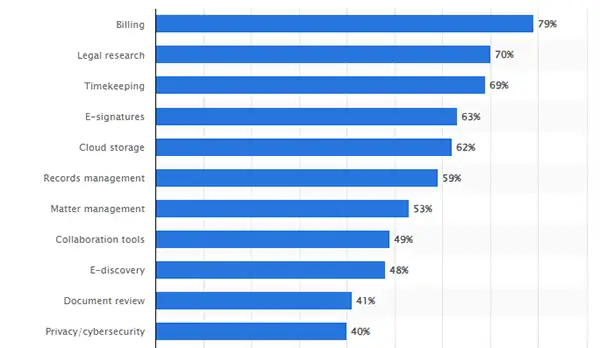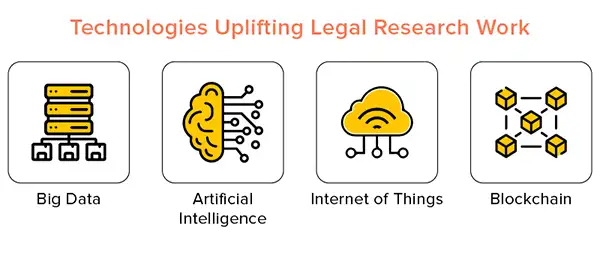Key Takeaways
- Big data, AI, the Internet of Things, and blockchain are the primary technologies uplifting Legal research work.
- 79% of billing in the legal industry is done via technological and digital means.
- 41% of document verifications are done via different legal tools.
The technological revolution is changing the landscape of many businesses. As technology advances, it’s time to explore the question: Is technology changing the legal industry? The answer is multifaceted and leads us into various aspects of the legal profession, from automation to virtual law practices.

Automation has become a significant component in almost every sector. Also popular as bots, they have made their presence in various domains of the internet as well. Be it social media applications like Instagram or digital business operations.
Similarly, even in legal tasks, these bots are getting more and more popular, especially in areas such as legal research. Gone are the days when paralegals and lawyers spent countless hours poring over law books and documents. Modern tools powered by AI and machine learning algorithms can quickly read, understand, and draft legal agreements.
A process that used to take hours or days now takes just minutes. This profound change is enhancing the efficiency of legal professionals, democratizing legal services, and making them more accessible and affordable to the general public.
These are the legal tech tools used by legal professionals for different roles.


The rise of virtual and remote law practices is redefining the legal landscape. Lawyers can now connect with clients globally, breaking from traditional geographical boundaries. Virtual law firms offer greater accessibility to legal expertise, bridging the gap between large cities and rural areas.
Moreover, remote working tools enable better work-life balance for legal professionals and provide opportunities for collaboration across borders. The challenge, however, lies in maintaining effective communication and ensuring confidentiality and security. These new methods call for adapting existing legal frameworks and embracing tools that aid in the seamless transition to virtual practices.

Smart contracts and blockchain are innovative technologies with enormous potential in legal transactions. Blockchain’s decentralized ledger system provides a secure and transparent way to record transactions, whereas smart contracts enable self-executing agreements. These technologies simplify and expedite legal processes, reducing the need for intermediaries and minimizing the risk of disputes.
For instance, in real estate transactions, smart contracts can automatically execute agreements when certain conditions meet the criteria, ensuring efficiency and trust. Though the application of blockchain and smart contracts in legal practice is still in its infancy, its potential to revolutionize legal transactions is clear.

In an era where data breaches and cyber threats are rampant, cybersecurity has become paramount in the legal industry. Protecting sensitive information is a fundamental responsibility for legal professionals.
Implementing robust cybersecurity measures and staying updated with the latest security standards are necessary in safeguarding clients’ and law firms’ interests. The reliance on digital platforms necessitates a strong focus on cybersecurity, elevating it from a supporting role to a core aspect of legal practice.

Technology is reshaping legal education, and altering how law is taught and learned. Virtual classrooms, online resources, and interactive simulations provide flexible and immersive learning experiences.
The boundaries of traditional education are expanding, and technology fosters an environment that encourages continuous learning and professional development. Preparing the next generation of legal professionals to embrace technology is vital in ensuring the continued growth and innovation of the legal industry.
Technology infiltrates the legal industry and raises complex ethical and regulatory issues. Developing regulations addressing new technologies and their implications is dynamic and challenging.
Striking the right balance between leveraging technology’s benefits and upholding ethical standards is a responsibility shared by legal professionals, lawmakers, and technologists. Whereas technology offers incredible opportunities for the legal industry, it also presents challenges that the industry needs to address.

Implementing technology in the legal field is not a theoretical concept but a reality already taking shape. Law firms are utilizing AI for contract analysis, legal e-billing software for streamlined billing processes, and virtual platforms for client interactions.
Case studies across various legal fields provide tangible evidence of successes and challenges in integrating technology. These real-world examples serve as a learning ground, offering insights and guiding the way toward a technologically advanced legal practice.
Big data, AI, the Internet of Things, and blockchain are the primary technologies uplifting Legal research work.

Since technology offers incredible opportunities for the legal industry, it also presents challenges that the industry needs to address. Data security, ethical considerations, and the need for continuous learning and adaptation can be daunting.
However, these challenges are manageable. They represent opportunities for growth, innovation, and the development of new skills. Embracing technology responsibly and proactively will enable the legal industry to thrive in this new era, fostering a more efficient, transparent, and accessible legal system.
The evidence is clear: Technology is indeed changing the legal industry. From automation and virtual practices to intelligent contracts and cybersecurity, the digital revolution reshapes how legal professionals practice law, teach it, and perceive it.
It’s an exciting and complex journey that calls for collaboration, adaptation, and a commitment to embracing innovation. The future of law is bright and digital, and it invites us all to engage, learn, and grow. Here’s to a lot where technology and law work hand in hand, crafting a more just and efficient world.